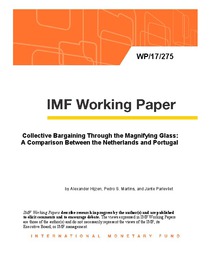Collective bargaining through the magnifying glass: a comparison between the Netherlands and Portugal

Hijzen, Alexander ; Martins, Pedro ; Parlevliet, Jante
IMF - Washington, DC
2017
42 p.
collective bargaining ; sectoral social dialogue ; labour market policy ; labour relations
IMF Working Paper
WP/17/275
Collective bargaining
English
Bibliogr.
"Since the global financial crisis, sector-level bargaining has come under renewed scrutiny. While in Southern Europe, the crisis raised concerns about the role of collective bargaining as an obstacle to labor market adjustment, in Northern Europe it was perceived more favourably and, according to some, may even have helped to weather the fallout of the crisis more easily. This paper seeks to contribute to a deeper understanding of sector-level bargaining systems and their role for labor market performance. We compare two countries with seemingly similar collective bargaining systems, the Netherlands and Portugal, and document a number of features that may affect labor market outcomes, including: i) the scope for flexibility at the firm or worker level within sector-level agreements; ii) the emphasis on representativeness as a criterion for extensions; iii) the effectiveness of coordination across bargaining units; and iv) pro-active government policies to enhance trust and cooperation between the social partners."
Digital
The ETUI is co-funded by the European Union. Views and opinions expressed are however those of the author(s) only and do not necessarily reflect those of the European Union or the ETUI.